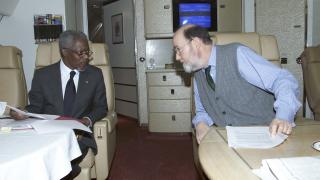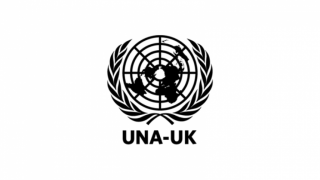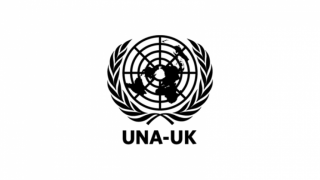
Sir Kieran Prendergast was appointed by Kofi Annan as Under-Secretary-General for Political Affairs at the United Nations between 1997 and 2005.
I still find it hard to accept that Kofi Annan is no longer with us. When I moderated a 90 minute public conversation with him in Geneva only three months ago, he was in sparkling form: witty, wise, articulate and relaxed.
Others will write more considered and comprehensive assessments. I would like to focus more on the personal. Kofi was immensely shrewd, with excellent judgment. He read documents slowly and with great care, but he remembered the detailed contents, often for years. He was an intent listener, grunting softly from time to time as if to indicate that he was following your thread.
Kofi was unusually trusting for a top official - you almost had to earn his distrust. But he was nobody’s fool. When he interviewed me for the job in February 1997, my predecessor (the late Sir Marrack "Mig" Goulding) gave me only one piece of advice: “be yourself: the Secretary-General will see straight through you otherwise’.
Kofi had a very high degree of emotional intelligence. In the eight and a half years I worked for him, I almost always left his office feeling better than when I entered it. If I was under the weather or upset, he spotted it immediately. I think it was this exceptional combination of empathy, balance and judgement that allowed him to develop relationships of confidence with an astonishing range of heads of state and government. He was very warm in manner - but very discreet when it came to substance.
Kofi was underestimated when he took office, but he rapidly developed a position of great authority both in New York and in capitals among the membership more widely. His manner was non-threatening and he used this to great advantage. Kofi was always ready to take risks for peace, though he invariably acted only after careful consideration and often having taken private soundings of a wide range of actors. Among the most striking achievements that spring to mind were to persuade President Habibie of Indonesia to commit to accepting international peacekeepers in East Timor if law and security order broke down (as it did); the reinsertion of the UN into an active role in the Middle East Peace Process - the "Quartet" of the US, UN, EU and Russia acting as mediators was his idea; agreement that for the first time since the 1960’s the UN should play the role of mediator and arbiter in Cyprus; and others too many to mention. He was successful in gradually making human rights a matter for discussion in the Security Council. And he could be very tough in addressing shortcomings in governance in his own continent of Africa.
Kofi will also be remembered for a series of seminal speeches, delivered at the outset of the General Assembly each September, in which he addressed difficult issues of collective security. One of these was the begetter of the doctrine of Responsibility to Protect.
Kofi was neither pompous nor self-important, but he had tremendous presence. More rock star than secular Pope, if truth be told. On every foreign visit there was an insatiable demand to be photographed with him. I remember especially the motorcycle outriders in Paris, the hotel staff in New Delhi, and the entire domestic staff in Netanyahu’s official residence, who poured out of the kitchen en masse as we were leaving. Of what other Secretary-General could that be said?
Of course there were failures too, and Kofi was not perfect - who is? But when I think of him the words of Shakespeare come to mind:
“...he acted from honesty and for the general good. His life was gentle, and the elements mixed so well in him that Nature might stand up and say to all the world, ‘This was a man’”.
Photo: Kofi Annan and the author en route to Bahrain in 2000 Credit: UN Photo






